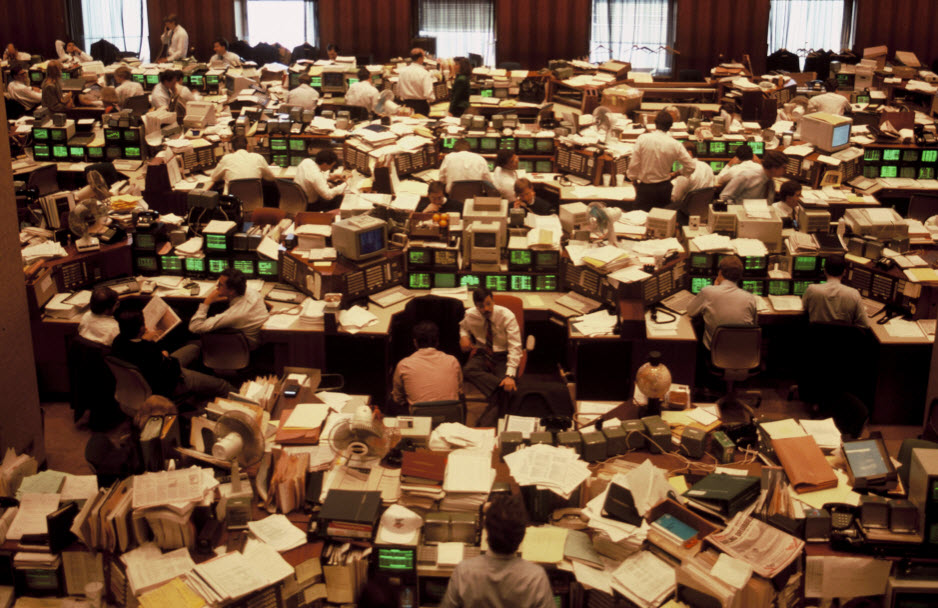A green 26 year old trader at Citibank learned a lot that day (and remember the bar afterwards too)
Today is the 30 year anniversary of Black Monday.

On that day, the stock market fell 508 points which was good enough for a 23% drop. It still is the biggest single day drop in history.
In a time when the Dow has made 51 new record highs this year and the S&P record closes is above 60, it is hard to image losing 23% in a single day.
Putting numbers to the fall in modern times a 23% decline in the stock market today would be equal to:
- A 5,290 point decline in the Dow
- A 589 point decline in the S&P
- A 1,520 point decline in the Nasdaq
I had to redo the math to make sure those numbers are right, but indeed they are correct.
Seeing them, makes you want to purchase some puts in your retirement portfolio, just in case
So where was I? What was I doing? What do I remember?
Personally, my memory bank is full of more pleasant memories and mostly about things in my personal life vs. my professional life. I'm the kind of person who can go see a movie and a week later not remember much about it.
However, memories about my kids or wife or parents or body surfing at the Jersey shore or the final drinks I shared with Nitin and Tim, and Dave before leaving London in 1995 and singing Bon Jovi before Karaoke was "a thing"... those are the things I remember in living color.
In fact in thinking back about the day, I wondered if I had an old picture from any office environment, and quite frankly, I don't have any. Not a single one. The picture above is kinda what it looked like. Big computers, messy desks. Mostly men in suit and tie. Smoking was permitted. Gene McGlyn had an ashtray full after every day.
Anyway, that day was unique, and I do remember some snippets of the day. However, I mainly remember the lessons on trading I learned.
I was 26 years young, and had been working at Citibank, NY (on Water Street in downtown Manhattan) in the Treasury/Funding area for about 2 years.
I was a junior trader in a small group of four. Our job, was to use financial derivatives to lower the cost of funding of the banks loan portfolio. Financial futures, interest swaps, forward rate agreements were instruments we traded/used to piece together/match against a loan portfolio that rolled over loans mainly in 6 and 12 month maturity range. We also had speculative book positions and may have been doing arbitrage trading to take advantage of mis-priciing in the market among the various interest rate instruments.
So we were dealing in the money market, with a maturity spectrum of 2 years and in.
On that Monday, I must admit, the focus was mostly on stock market. The interest rate market was not as volatile. This was new paradigm and traders really did not know how to react given such the stock tumble. So I recall more two way trading going on and not Wall Street movie panic - at least in the market I was trading.
Having said that, it was the days after Black Monday, that the idea that the Fed would come in, provide liquidity, lower rates. It was during those days that we experienced our Black Monday and historic-ish type trading.
So lesson learned was large stock declines, can lead to large declines in rates to the downside. In today's market, that reaction would be more immediate. There would not have been a delay. So the connection between crashes and interest rates was solidified.
What I also learned was the need to have a greater focus on risk. It is the losses that matter the most. The wins happen, if the losses don't happen. I can't say I wrote my trading book in my head at the time, and started talking about "defining risk and limiting risk" (like I do each day here), BUT it certainly became more clear. My mindset for trading became more focused on defining and limiting risk vs reward and I live by that mindset today.
When the day was done, Ted, Griff, Evan and I left the office for the bar. What more iconic Wall Street bar to go to on such a historic day, then Harry's at Hanover Square. I remember going in, and it was packed. Again, lots of men in suits, smoking and drinking. There were some news crews there and I remember them interviewing Evan about the day, and what he expected going forward.
Evan was older than I. He had a MBA from Columbia University. He was very smart, and calculated. Not a gun slinging guy, but I remember him clearly saying (on TV) he expected the market to bottom soon and recover. It had gone too far. There was panic and blood in the street, but it was overdone.
I remember thinking, "he's crazy, this market is going lower".
If you look back on it, the market did bottom, after a final blow out low to 1616.21 in the Dow on Tuesday. The high that day reached about 2050 - a near 400 point reversal (24% from the low).
The market did consolidate for a period after that as the dust settled, the economy recovered, but Evan was right. It was overdone. The sun did come out and that provided a trading opportunity.
That was another major lesson learned from what was indeed a very Black, and dark, Monday.





